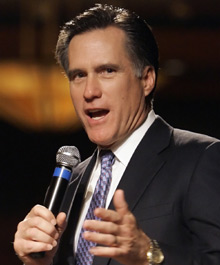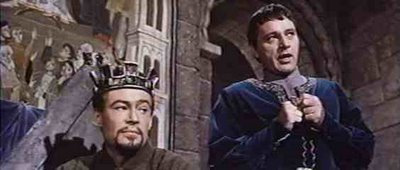 I watch American Idol. Please help me… I think I may need an intervention… I could try chalking it all up to the influence of my kids, they are crazy about it, and I remember when we all used to watch the Ed Sullivan Show as a family when I was a kid, but I have to admit that I wouldn’t watch this show at all if it wasn’t for Simon Cowell. Simon is actually the real star of the show. Even though he hasn’t got a scintilla of talent of his own, even though his history of success as a producer and professional judge of talent is spotty at best, I think Simon is the real reason why most people watch the show. In fact, I think there is evidence that there is a whole college-age subculture out there that votes to elevate weak contestants like Taylor Hicks week after week just to get under Simon’s skin and provoke him.
I watch American Idol. Please help me… I think I may need an intervention… I could try chalking it all up to the influence of my kids, they are crazy about it, and I remember when we all used to watch the Ed Sullivan Show as a family when I was a kid, but I have to admit that I wouldn’t watch this show at all if it wasn’t for Simon Cowell. Simon is actually the real star of the show. Even though he hasn’t got a scintilla of talent of his own, even though his history of success as a producer and professional judge of talent is spotty at best, I think Simon is the real reason why most people watch the show. In fact, I think there is evidence that there is a whole college-age subculture out there that votes to elevate weak contestants like Taylor Hicks week after week just to get under Simon’s skin and provoke him.Why am I fascinated by his put-downs? Is this bad for my kids, or is it something not worth taking seriously? What do shows like American Idol and the whole suite of Reality TV shows say about the “culture of bullying” we increasingly see around us? I’m starting to wonder if in the waning years of my career I’ll be confronted at work by a coterie of managers young enough to be my kids who will “vote me off the island” with the kind of blunt-edged “honest feedback” we are growing to become accustomed to seeing from the likes of Simon Cowell and Donald Trump.
The article Watch your back, the Bully Culture is upon us is a couple of years old, but still carries some powerful points and questions…
Remember 10 years ago, when tech stocks were booming, the Web was a new plaything and Bill Gates looked like he was one step away from Emperor of the World?
It was the Age of the Nerd, the era when the pocket-protector brigade seem to hold the future of the rest of us in their un-manicured hands. The Nerd (or Geek, Dweeb, insert your own love/hate epitaph) was ascendant, demonstrating that the Bible was off, but only by a single letter — The geek shall inherit the earth. Even the Vice President was one.
That period is over now. But the notion that life resembles high school lives on. Nowadays, there’s a new schoolyard type astride the culture. The Nerd is out; the Bully is in, setting the tone of public discourse, providing the image of what success looks like and holding the future of the rest of us in his hands. Even the Vice President is one.
There’s no other way to explain, for instance, the sudden re-emergence of Donald Trump, the buffoonish egoist who, for a while there, looked like he was going to sail into 1980s-nostalgia oblivion alongside Lee Iacocca and Ed Meese. But here we are in 2005, watching the Donald scowl and growl "You’re fired!" — when we’re not watching Simon Cowell eviscerate his many lessers on "American Idol" — in what passes for an evening’s entertainment.
The falsely labeled phenomenon known as "Reality TV" puts people in situations where bullying behavior is rewarded with boffo ratings. On the news channels, every aspirant to the pundit class is working on his/her bully skills, with the conviction that sharp elbows and bluster is the way to join the ranks of Hannity, O’Reilly and Limbaugh (Let’s give ol’ Rush credit for being an SOB back before SOBs were cool).
Yes, the left is capable of playing the bully as well. Ask anyone surrounded by "tolerant" progressives who smokes or eats red meat or drives a Hummer. Ask anyone who’s been interviewed by Michael Moore. …
As for the president, he’s always struck me as a particular sub-species of the bully you might call a "towel snapper." You know the type, the guy who puts his arms around your shoulders for a good-natured, insincere apology after pulling a nuclear wedgie on you in front of the whole school at assembly.
Business. Sports. Entertainment. Government. With Bully Culture rising in all sectors of our society, the implicit signal to those of us living normal lives is that the ends always justifies the means whether it’s in the workplace, the neighborhood or the family.
Bullying, from the schoolyard to the boardroom, is often just a case of meanness exercising its temporary power. But it’s just as often something else entirely, a kind of righteous blindness, the belief that being right gives you license to treat people like a dog treats a fire hydrant.
The Bully Culture shows no signs of abating, but comeuppance is an inevitable part of the bully’s existence. There will come that day when the antibodies in the body politic will expunge this latest threat to our cultural health, and we call all scream at the last episode of "The Apprentice": "Hey, Trump. You’re fired."
Not to be a holier-than-thou, but here is an interesting column looking askance in particular at American Idol's rehearsal round, Is American Idol Insulting to Human Dignity?
Let me ask you this: When you were in middle school, did you mock the "retards"? As an adult, do you continue this behavior by laughing at some of the emotionally and/or physically disadvantaged contestants on "Idol"? Do you have children of your own? If so, then you ridicule the "different" folks together as a "family affair" pastime? How does doing this make you feel? I'm just tryin' to understand, friends.












